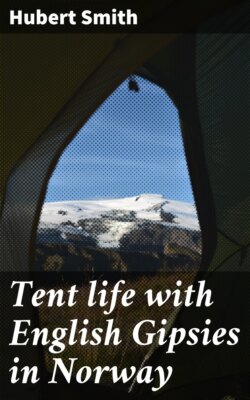Читать книгу Tent life with English Gipsies in Norway - Hubert Smith - Страница 14
На сайте Литреса книга снята с продажи.
NORWEGIAN MONEY.
Оглавление| 1 | skilling | equals nearly a halfpenny. |
| 24 | skillings | equal a mark or ort, or 10¾d. |
| 5 | marks or orts | equal a specie dollar or 4s. 5¼d. |
There are dollar notes. One (een), variegated coloured paper; five (fem), blue; ten (ti), yellow; fifty (femti), green; one hundred dollars (hundrede dollars), pink.
Immediately Presten Sundt caught sight of our gipsies at the station, he commenced speaking in the Romany language. He tried their knowledge of Romany numerals. Noah, we believed, failed at five or six. Their reckoning powers are not of high order, especially as they are unable to read and write.
Baudrimont, in his work containing a vocabulary of the gipsy language, spoken by gipsies wandering in the French territory of the Basque Provinces, says, the gipsy women he questioned say “jec” for one, “doui” for two, and they did not know any higher numeral, using beyond two, “b8ter” (bouter) signifying “much.”22
It is curious to notice, even in one word, the different methods of spelling, adopted by each author. The Romanes, not being a written language, and the opportunities of obtaining it from these wanderers over the world, being few, each author has struggled into print, with a vocabulary formed on some phonetic system of his own. Again, what a different sound, may be given to a word, by some slight modification of accent, depending upon the education, and temperament, of the individual speaking. For instance, if a stranger, unacquainted with English, but taking an interest in the language, came to England, for the first time, and wrote down in his note-book, English words spoken by the less educated natives, of Hampshire, Staffordshire, Lancashire, Yorkshire, Gloucestershire, Derbyshire, or Dorsetshire, what a variation he would find, in the spelling, and pronunciation, of many words, so collected. It is not, therefore, singular that gipsy philologists, should differ in their spelling. It is only extraordinary, that the accuracy of sound, distinguishing each word, has been so well conveyed. For example, take the word “much.” Baudrimont gives b8ter (bouter); Bryant’s collection, published 1785, gives “bootsee;” Borrow gives Spanish gipsy “buter” and “butre,” signifying “more.” Most of the other philologists give “but.” Presten Eilert Sundt gives “but” in his extensive vocabulary of the Norwegian Romany. One author (Dr. Bath C. Smart) gives “booty” and “boot,” and also “kissy.” Our own gipsies give “koosee” as the Romany for “much.”
At page 25 of his work,23 M. Baudrimont says: “The gipsies have without doubt forgotten the numerals, for the women I questioned, only knew two.” Mr. F. Michel gives five;24 Mr. Balby gives ten. Baudrimont has collected 245 Romany words, which, with those taken from the vocabulary of Mr. F. Michel, increase the number to 352. We notice some repetition of words in his vocabulary, which reduces the actual number.25
Our gipsies seemed to interest Presten Sundt. Noah and Zacharia were not so dark, as he expected to see them; Esmeralda seemed quite equal to the standard of gipsy type. Their ages, and a variety of questions, were asked in a very short time. Presten Sundt is a man of much energy, and rapidity of manner, and he was conversant with the English language.
We were sorry Presten Sundt had not an opportunity of seeing our tents; they were the same kind as those used by the gipsies who travel England. Esmeralda and Zacharia took their places in the second-class compartment, of the same carriage in which we travelled. Noah went in the same van with the donkeys.
Presten Sundt and his son, Mr. Bennett, Mr. T., the invalid barrister, and our active cicerone sent by the Chevalier, were assembled on the platform, and wished us bon voyage, as the train moved out of the station. Was not one wanting? He may have missed his road. He was not there—the Birmingham bagman had been left behind.
